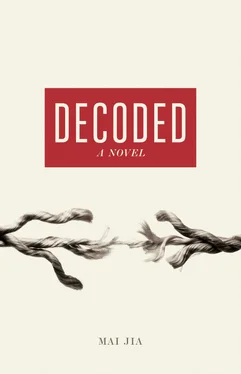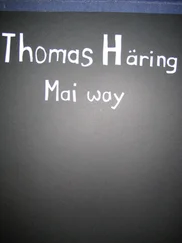Mai Jia - Decoded
Здесь есть возможность читать онлайн «Mai Jia - Decoded» весь текст электронной книги совершенно бесплатно (целиком полную версию без сокращений). В некоторых случаях можно слушать аудио, скачать через торрент в формате fb2 и присутствует краткое содержание. Год выпуска: 2014, Издательство: Allen Lane, Жанр: Современная проза, на английском языке. Описание произведения, (предисловие) а так же отзывы посетителей доступны на портале библиотеки ЛибКат.
- Название:Decoded
- Автор:
- Издательство:Allen Lane
- Жанр:
- Год:2014
- ISBN:нет данных
- Рейтинг книги:3 / 5. Голосов: 1
-
Избранное:Добавить в избранное
- Отзывы:
-
Ваша оценка:
- 60
- 1
- 2
- 3
- 4
- 5
Decoded: краткое содержание, описание и аннотация
Предлагаем к чтению аннотацию, описание, краткое содержание или предисловие (зависит от того, что написал сам автор книги «Decoded»). Если вы не нашли необходимую информацию о книге — напишите в комментариях, мы постараемся отыскать её.
Decoded — читать онлайн бесплатно полную книгу (весь текст) целиком
Ниже представлен текст книги, разбитый по страницам. Система сохранения места последней прочитанной страницы, позволяет с удобством читать онлайн бесплатно книгу «Decoded», без необходимости каждый раз заново искать на чём Вы остановились. Поставьте закладку, и сможете в любой момент перейти на страницу, на которой закончили чтение.
Интервал:
Закладка:
If Liseiwicz was ever unfair to Zhendi, it came much later and came about as a result of the mathematical chess game that they had developed together. It ended up being very influential in mathematical circles in Europe and America — lots of mathematicians played it. It wasn’t called mathematical chess though, because it was named after Jan Liseiwicz: Liseiwicz chess. I got to read a number of articles on Liseiwicz chess over the years and people clearly thought very highly of it. Sometimes its significance was even compared to that of von Neumann’s theory of chess as a two-person zero-sum game. It was said that while von Neumann’s concept was of particular importance in economic theory, Liseiwicz chess had great significance in military strategy. Although the practical applications of the two games had yet to be demonstrated, their theoretical importance was supposed to be enormous. People pointed to Liseiwicz, the youngest ever recipient of the Fields Medal, and said that he was an ornament to the world of mathematics — however, after he went to China, he had really done no original research of any importance with the exception of Liseiwicz chess — the last great achievement of his later career.
As I said before, Liseiwicz chess was originally known as mathematical chess and it was developed by Jan Liseiwicz and Zhendi together — Zhendi deserves some of the credit. Once Liseiwicz called the game after himself, there was no chance that Zhendi’s role would be recognized: he was eliminated from the story and Jan Liseiwicz took all the credit himself. You could say that he was unfair to Zhendi, but you could also say that the pair were really fond of each other and that Liseiwicz really did do his best for the boy. . [To be continued]
9
Early in the summer of 1950, it began pouring with rain one evening and just continued through the night without a break. Enormous raindrops fell against the tiles, sometimes with a noise almost like that of hammering, at other times with a duller thudding. From the sound of the rain lashing against the roof, you might have imagined that there was some kind of giant centipede up there, running for its life. The changes in the noise were the result of the wind getting up — when it blew strongly the sound became sharper. At the same time you could hear the tug of the wind on the window frames. Thanks to all this racket, Young Lillie hadn’t slept at all well. The sleepless night had given him a headache and his eyes were somewhat swollen. He listened to the sound of the wind and rain, realizing that he and his house were both getting old. He finally fell asleep just before dawn. However, he woke up again pretty quickly — something seemed to have woken him. Mrs Lillie said it was the sound of a motor-car.
‘It sounds as though a car has stopped downstairs,’ she said. ‘It will be gone in a moment.’
He knew that he was not going to fall asleep again, but Young Lillie stayed in bed. Once it was dawn, he got up the way that an old man does get out of bed, feeling his way, moving so gently that he made almost no noise, like a shadow. After he got up, he didn’t even go to the bathroom — he went straight downstairs. His wife asked him why he was going downstairs. He didn’t know. He just carried on going, fumbling in the dark, and once he got there, he opened the front door. There were two parts to the front door. The inner door opened into the house; the outer door opened out into the courtyard. The outer door seemed to be being blocked by something because you could only open it a crack, maybe 30 degrees. Since it was summertime, the outer door was in use — a piece of cloth had been hung over the frame so that during the daytime you could leave it open but people couldn’t see into the house. The old man couldn’t see what was blocking the door, so he had to turn sideways and slide out through the crack. He discovered that two enormous cardboard boxes were filling the tiny courtyard. The first one was blocking the door, stopping him from getting in and out; the second one had already become sodden in the wind and rain. The old man tried to push the second box somewhere out of the rain but he simply couldn’t move it — the contents couldn’t have been heavier if they had been paving slabs. He inched his way back into the house and found a couple of pieces of oiled paper to cover it with. Once he had done that, he noticed that there was a letter on top of the box, held down by the stone they normally used to prop open the front door.
The old man picked up the letter — it was from Jan Liseiwicz.
This is what he had to say:
Dear Lillie,
I am leaving and since I do not want to put anyone to any trouble, I have decided to say goodbye in this letter — I hope you can forgive me. I need to talk to you about Jinzhen — in fact, I can’t be happy until I have told you what I what I want to say. The first thing is that I hope he gets well soon. The second is that I hope you will make the best possible arrangements for his future, so that we (by which I mean humanity as a whole) can gain the greatest benefit from his genius.
To tell you the truth, in my opinion, letting Jinzhen immerse himself in an enormous and complex mathematics research topic would be the most suitable use for his remarkable talents. That in its turn creates a further problem. The world has changed, people are becoming more and more short-sighted and profit-orientated; they want to see some immediate and concrete benefit and are less and less interested in topics of purely theoretical application. This is completely stupid. It is no less stupid than entirely subordinating pleasures of the mind to those of the body. However, we cannot change this fact, any more than we can guarantee that the scourge of war has been completely eliminated from our society. It was because of this that I started to wonder whether it might not be better to encourage him to become immersed in a technical topic which would be of some concrete practical benefit. The good point of that kind of research is that you get great encouragement from it: each result pushes you on to the next one — it can be deeply fulfilling. The downside is that once you have finished you have also lost control of your project — your own personal wishes on the subject will be ignored. Your creation may bring great benefits to the world, or it may bring great harm — either way, you have no choice but to stand aside. It is said that Oppenheimer now really regrets his work on the first nuclear bomb and that he would like to rescind his creation — if he could destroy it with a blow from a hammer like a statue, I am sure that he would. But is that kind of thing possible? Once the genie is out of the bottle, you cannot put it back in again.
If you decide that you want him to try and undertake a scientific research topic, let me suggest that he work on artificial intelligence. Once we have solved that particular mystery, we will be able to create a machine that in some way mimics the human mind, and the next step will be the development of robots — inanimate human beings. Science has already begun to unlock the secrets of other organs — eyes, noses, ears — we are now even in a position where we can create artificial wings. Why cannot we begin to work on artificial intelligence? The fact is, the development of the computer involves the creation of a kind of artificial intelligence, though it is solely concerned with calculations. Since we can already create a machine that can carry out that kind of function, surely other aspects cannot be too far behind? Think about it for a moment: if we have this kind of inanimate human beings — creatures made of metal, robots powered by electricity — how many uses they could be put to! In this generation we have suffered so much warfare — in the space of less than half a century we have been forced to go through two world wars. What is more I suspect (indeed I have already seen some proof) that soon we will have another war — what a terrible thing that is! In my opinion, humanity can now make warfare even more appalling, even more frightening, even more terrible that at any point in history. It is now possible to kill a truly enormous number of people on the same field of battle, to have them die at the same time, to have them die instantly, to have them die the moment the bomb explodes. It seems that we will never be rid of warfare, and yet the hope that one day we can rid the world of this scourge has been handed down from one generation to the next. Mankind is faced with many terrible problems of this kind, which require enormous labour; which require exploration in dangerous circumstances. . Mankind seems unable to extract itself from the difficulties that beset it.
Читать дальшеИнтервал:
Закладка:
Похожие книги на «Decoded»
Представляем Вашему вниманию похожие книги на «Decoded» списком для выбора. Мы отобрали схожую по названию и смыслу литературу в надежде предоставить читателям больше вариантов отыскать новые, интересные, ещё непрочитанные произведения.
Обсуждение, отзывы о книге «Decoded» и просто собственные мнения читателей. Оставьте ваши комментарии, напишите, что Вы думаете о произведении, его смысле или главных героях. Укажите что конкретно понравилось, а что нет, и почему Вы так считаете.












